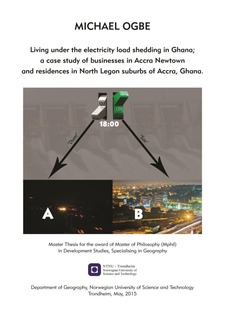| dc.description.abstract | In this twenty-first century, electricity has become the pivot of global activities. Electricity has become the engine for social development and economic growth (Pachauri et al., 2011). The world lives and operates on electricity - electricity is so vital to our everyday lives. However, access to adequate and reliable electricity is a big issue in most developing countries (Brew-Hammond, 2010, Kanagawa and Nakata, 2008, Reddy et al., 2000) and Ghana is of no exception. This provides the starting point to this seven-chapter qualitative research on ‘living under the electricity load shedding in Ghana; a case study of businesses in Accra Newtown and residences in North Legon suburbs of Accra, Ghana.
The data for this research were collected in the summer of 2014 in Ghana The informants were categorised under three groups; institutions involved in the electricity load shedding, offset printing presses in Accra Newtown and households in North Legon suburbs of Accra. In all, four institutions (MoP, VRA, GRIDCo and ECG), ten business owners and ten households were interviewed with the help of semi-structured interview guides. One focus group discussion was also conducted. All the interviews and discussion were conducted in both English and Twi language, recorded and later transcribed into English and analysed thematically by the researcher.
Theoretically, I positioned myself within the Capability Approach by Amartya Sen coupled with the Right Based Approaches to Development by Britha Mikkelsen; and Structuration Theory by Anthony Giddens to develop a conceptual framework for the research.
From the data, it was found out that, the electricity load shedding is as a result of two major challenges. The first major challenge boils down to the policies and decisions of the government. The other challenge had to do with the non-performance of responsibilities by the duty bearers.
The research therefore argues that though the duty bearers could contribute to the wellbeing of the right holders in the electricity sector in Ghana, with the findings, the load shedding in Ghana has led to an adverse impact on the wellbeing of the right holders (businesses and households) in the research area. | nb_NO |
